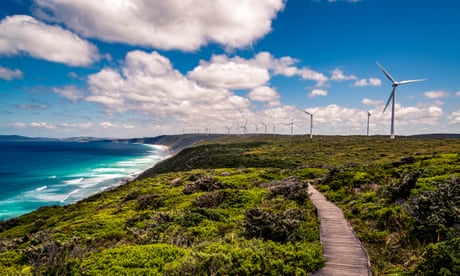- by foxnews
- 08 Apr 2025
‘Cutting through the greenwash’: Australian energy retailers ranked on climate action
‘Cutting through the greenwash’: Australian energy retailers ranked on climate action
- by theguardian
- 08 Feb 2022
- in news

Australian electricity providers have been ranked on their climate credentials in a new consumer guide that aims to cut through "greenwash".
Greenpeace's 2022 Green Electricity Guide, released on Tuesday, assessed 48 Australian energy retailers on six main criteria: providing renewable energy, ending coal use by 2030, halting fossil fuel expansion, supporting new renewable energy, transparency of marketing and pollution and environmental harm. Then, each provider was given a score out of five stars and ranked.
This is the first time the guide has been updated since 2018. Glenn Walker, a senior energy campaigner at Greenpeace and author on the 2022 guide says that the researchers placed more emphasis on "cutting through the greenwash and spin" when producing the update. This included reviewing provider websites and marketing materials to "assess how upfront they are with where their energy comes from".
Tim Baxter, senior researcher of climate solutions at Climate Council, says helping consumers see past marketing efforts is important . "Electricity is the most complicated system that most of us never have to think about," he says.
"That makes it difficult for a consumer to know what is happening when they flick their light switch on. A complicated system makes that extremely easy for any provider that is looking to pull the wool over their customers' eyes."
Australia's energy giants make up the bottom of the ranks. "They are the worst polluters, and are the companies people should be switching away from," Walker says.
AGL, Australia's biggest provider, scored one star, placing "dead last" behind Origin and Energy Australia, which also scored one star. The score is a precipitous drop from AGL's fifth place in 2018, but Walker says the result is "no surprise".
Owning and running "huge, dirty coal burning power stations" is just part of the problem. Walker says a greater worry is these providers are "not moving fast enough to retire those power stations".
"The science is very clear. We know now that Australia cannot burn coal beyond 2030. Any company planning to burn coal beyond that should be heavily marked down."
In a statement, AGL did not directly address its ranking, but said: "As the country's largest electricity generator and retailer, we recognise our significant role in Australia's energy transition."
The statement outlined a number of AGL's renewable projects and investments, and said, "today we operate the largest portfolio of renewable assets of any ASX-listed company".
"We have been focused on our commitment to transition to net zero."
However, Walker calls AGL "the greenwash case in point".
"Most of their ads feature solar and windfarms. They give the impression that they are a leader of clean and green energy. They say they will get to net zero by 2050 as a company. But they want to continue mining and burning coal right up until 2048."
The AGL statement continued: "There is no doubt that coal fired generation will exit the system earlier than previously expected enabling a faster decarbonisation pathway. However this must happen as part of a coordinated plan across governments, industry, regulators and the community. Without this we create market uncertainty and put at risk energy reliability and customer affordability."
"Encouragingly, since the 2018 report there has been a race to the top," Walker says. The guide's top billed retailers are "pure-play renewable electricity companies" who are investing heavily in renewable energy.
"They are not involved in mining fossil fuels, and are really transparent about their business. From every angle we assess them, they are helping transform our energy system to make it cleaner and greener."
Enova Energy and Diamond Energy "stood out with five star ratings," taking the top two positions. Diamond Energy operates solar and wind energy plants, while Enova Energy contract only renewable energy from electricity generators, and harness excess energy from customers' rooftop solar panels.
In 2018, Powershop ranked first place in the guide. It has fallen to 10th place this year, after its acquisition by fossil fuel giant Shell in 2021. Six thousand of Powershop's customers reportedly switched providers after the acquisition. That demonstrates "a strong consumer concern" in the role their provider plays in the climate crisis, Walker says.
With a "bewildering array of choices out there in terms of energy providers," head of the University of New South Wales school of photovoltaic and renewable energy engineering, professor Alister Sprout, says the Greenpeace Guide is "useful advice for consumers".
However, Dr Hedda Ransan-Cooper, who leads the social science program within the battery storage and grid integration program of Australian National University's college of engineering and science, is wary of putting responsibility on the consumer.
"There is a real lack of leadership from the government on solutions and pathways forward to how the transition should unfold," she says. "Not everybody has the time, or capacity, to do levels of research and shop around for energy."
While Ransan-Cooper trusts "a proportion of active, engaged people" will make decisions based on the guide, she questions "how many people it is reaching".
Walker says the ultimate goal is to "provide consumers with an easy-to-use tool".
"The quicker we switch, the better it is for prices, and the quicker we will see Australian climate pollution drop," he says. "Both benefit consumers, and consumers can be at the forefront of that."
- by foxnews
- descember 09, 2016
Ancient settlement reveals remains of 1,800-year-old dog, baffling experts: 'Preserved quite well'
Archaeologists have recently unearthed the remarkably well-preserved remains of a dog from ancient Rome, shedding light on the widespread practice of ritual sacrifice in antiquity.
read more


